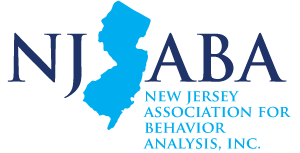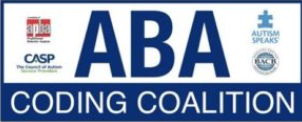MISSION
The NJABA Insurance, Medicaid, and Business Practices (IMAB) Workgroup is dedicated to promoting the professional practice of applied behavior analysis (ABA) in the context of publicly and privately funded services and the business development interests of professional behavior analysts. The IMAB workgroup seeks to increase the insurance industry’s capacity to provide high-quality behavioral services to all insureds and increase our ability to provide high-quality, ethical, and evidence-based behavior analytic services to all.
We strive to support to current and prospective behavior analysts and business owners on the following:
- Insurance
- Claims submission process inc. CPT codes and more
- Communication with insurance carriers
- Becoming credentialed with insurance carriers and CAQH
- In-network exceptions
- Medicaid EPSDT Coverage for Children with Autism (State of NJ is in planning phase)
- Business Practices
- Establishing a business
- Business and labor laws and regulations
- General/professional/auto/workman’s compensation insurance
- Policies, procedures, and business forms
- HIPAA compliance
- Human resources
- Marketing plans
- OBM
Leadership Committee
Craig Domanski, Ph.D., BCBA-D and Cara Graham, M.A., BCBA, Co-chairs
Kathleen McCabe-Odri, Ed.D., BCBA-D, FAQ Coordinator
What Members Are Saying
“I enjoyed participating in the NJABA Insurance Workgroup call. It was great to learn more about the issues faced by others. Just wanted to say thank you for providing an invaluable resource to all of us by taking on issues like these. It is a comfort to know we have a strong advocate in our corner!”
– Tracy A. Menzie, Psy.D., BCBA-D
2026 Upcoming Meetings
Wednesday, February 25, 2026 12-1pm via Zoom
Wednesday, March 25, 2026 12-1pm via Zoom
Wednesday, May 27, 2026 12-1pm via Zoom
NJABA Annual Conference June 25, 2026, 12-1pm
Workgroup meetings will be held via Zoom unless otherwise noted. The Zoom link is sent to workgroup members a few days prior to each meeting.
Please RSVP to the workgroup chair.
Interested, but unsure if you’d like to officially join? Come to a meeting to learn more and network with colleagues. All are welcome! For general inquiries, email info@njaba.org or 609-910-0394.
FAQ
Where is the best place to find resources for resuming my business after the COVID-19 pandemic?
What coverage do individuals with autism have through their private health insurance?
According to Autism New Jersey, the state passed a mandate, P.L. 2009 c. 115 Health Benefits Coverage for Autism and Other Developmental Disabilities, which requires fully-insured plans written in the state of New Jersey to cover the following for autism and other developmental disabilities:
- Expenses for screening and diagnosis of autism spectrum disorders (ASD) or other developmental disability (DD)
- Medically necessary physical therapy, occupational therapy and speech therapy for individuals with ASD or other DD
- Medically necessary behavioral intervention based on the principles of applied behavior analysis (ABA) for individuals with ASD or other development disabilities
- Certain family cost share expenses incurred through New Jersey Early Intervention. Their publication, Autism and Health Insurance Benefits Fact Sheet provides an overview of coverage for autism-related therapies, and their publication, Health Coverage Options for Autism and Other Developmental Disabilities, provides a more in-depth explanation. Regularly check the insurance section of Autism New Jersey’s website for updates given the likely repeal and replacement of the Affordable Care Act and the changes in coverage the replacement may bring.
What is the process in starting ABA services through health insurance?
Each health insurance company, or carrier, has its own process regarding implementing ABA therapy for their members. It is recommended to contact the carrier directly (by calling the Provider phone number listed on the back of the member’s insurance card) to get details on its specific policies.
Typically, the provider should first call to verify benefits by calling the carrier. Contact information for several major health insurance carriers can be found on Autism New Jersey’s website.
What are some guidelines to follow when providing ABA services through health insurance?
Both the Association of Professional Behavior Analysts (APBA) and the Behavior Analyst Certification Board (BACB) have information available online about the provision of ABA services through health insurance (note that the APBA’s information is available to members only). One helpful resource is: Applied Behavior Analysis Treatment of Autism Spectrum Disorder: Practice Guidelines for Healthcare Funders and Managers (2nd ed.).
How can this workgroup and others help me understand the CPT codes that went into effect in 2019?
The new CPT codes are here! Take a few minutes to let us know about your successes and challenges working with insurance carriers so we can better advocate for you. We have an open dialogue and collaborative relationship with Horizon BCBS and can do so with other carriers. So, tell us how the new codes are affecting your practice to ensure your concerns are brought to thetable. Email info@njaba.org or call (609) 910-0394.
ABA Coding Coalition
The Coalition’s purpose is to support implementation of the 2019 CPT code set by ABA service providers and payers through education, materials development, monitoring, and information dissemination. To that end, the Coalition will operate a website where print resources, announcements, and a portal for submitting questions will be available at no cost.
Who can provide ABA services through an insurance company?
Each carrier may have specified the credentials of various provider types that may implement behavior-analytic services. Most carriers require a program to be overseen by a Board Certified Behavior Analyst (BCBA-D/BCBA) or a Qualified Health Care Professional (QHCP); while the QHCP does not necessarily specify certification that a BCBA possesses, most carriers will specify the BCBA-D/BCBA certification to fulfill that role. It is recommended that providers discuss specific requirements with each individual carrier under which they may be providing services. Similarly, carriers may have different requirements for individuals who are performing direct therapy under the supervision of the BCBA. Common titles for these individuals may be “therapist,” “tutor,” “paraprofessional,” or Registered Behavior Technician (RBT). It is recommended that providers discuss specific requirements with each individual carrier under which they may be providing services.
Do therapists need to be certified as RBT to perform therapy?
Not necessarily. Many carriers currently do not require the RBT credential for “line therapy.” However, they may do so in the future. It is recommended that providers discuss specific requirements with each individual carrier under which they may be providing services.
I have concerns about the ethical practices in a group home where an adult with ASD lives. What can I do about it?
If you suspect abuse or neglect, review Unusual Incident Reporting forms and instructions.
What happens if a family’s plan doesn’t cover ABA services?
If a family’s plan does not cover ABA services, their insurance plan will not pay for or reimburse the cost of the services. Note that the state autism mandate only applies to “state-funded” health insurance plans; “self-funded” plans are not subject to the mandate and may list ABA as an “excluded” service. Providers should verify benefits prior to delivering services. Autism Speaks has created the Self-Funders Employer Toolkit to help families lobby their employers to opt to cover ABA services.
What is an NPI?
NPI stands for Provider National Identifier. There are 2 types of NPI numbers: individual and group. NPI numbers are required when providers bill health insurance carriers. Application information can be found here.
What is CAQH?
CAQH stands for Council for Affordable Quality Healthcare. The CAQH maintains a database verifying the credentials of providers that carriers can access. Completion of the CAQH process is necessary for providers joining the networks. (Out-of-network providers do not need to complete the CAQH process.)
What does it mean to become “credentialed” with an insurance company?
Credentialing is the process by which the CAQH verifies the experience and credentials of service providers. Providers need to be credentialed to become “in-network.”
What are the pros and cons to being an “in-network” provider?
Being an “in-network” provider means that you or your practice has contracted with an insurance carrier and have joined their network of providers.
Some pros to joining the network may include:
· Steady stream of clientele referred to you by the carrier
· Your practice may be listed on the carrier’s website so families can locate/contact you
· Access to electronic submission of claims and forms
· Access to numerous informative documents that may help guide your practice
· Lower cost to families
Some cons to joining the network may include:
· Subject to the carrier’s guidelines for practice
· Subject to the carrier’s set rates for each service
What are the pros and cons to being an “out-of-network” provider?
Being an “out-of-network” provider means that your practice will work with an insurance company but have not signed a contract to join their network.
Some pros to being an “out-of-network” provider include:
· Free to develop own practice and record keeping guidelines in accordance with best practices
· Free to negotiate rates with a carrier
· Not required to charge families copayments for services
Some cons to being an “out-of-network” provider include:
· Carriers disseminate limited information to you
· Carriers may not permit e-submission of claims
· Some families may not have “out-of-network” benefits in their policy
· Extra cost for families (e.g., co-insurance, deductibles)
What is CPT?
CPT stands for Current Procedural Terminology. These are alpha-numeric codes assigned for specific services.
What are the services specified with the CPT codes?
A coalition of autism and Applied Behavior Analysis organizations compiled a crosswalk of CPT® code information to achieve consistency in utilization and implementation of – and ultimately in establishing valuation and reimbursement rates for – the new Category III codes for reporting adaptive behavior assessment and treatment services to health insurance plans.
This chart is organized by the essential elements of ABA services, as indicated by the Behavior Analyst Certification Board (BACB). Those services include assessment and reassessment, treatment plan development and revision, direct treatment of individual clients, supervision or direction of technicians by a professional behavior analyst or other Qualified Healthcare Professional (QHCP), family or caregiver training, and group treatment.
Autism New Jersey’s Executive Director, Dr. Suzanne Buchanan serves on the workgroup that reports to the Steering Committee for this and related efforts and welcomes your questions and input.
What is the diagnosis code for Autism Spectrum Disorder?
According to the DSM-V and ICD-10, the diagnosis code for ASD is F84.0. This code is required when getting services authorized as well as when submitting claims.
How to I submit a claim form to have services reimbursed?
Each health insurance company, or carrier, has its own process regarding submitting claims for ABA therapy. It is recommended to contact the carrier directly (by calling the Provider phone number listed on the back of the member’s insurance card) to get details regarding its specific policies.
Typically, a “CMS-1500” form is used to submit claims. Options to either mail, fax, or submit electronic versions differ from carrier to carrier. There are also different policies regarding claims depending on whether a provider is in-network or out-of-network. For example, Value Options offers these tips for completing the CMS 1500.
Who can I call at the insurance company if I have any questions?
Autism New Jersey has worked with the major insurance carriers to identify the best contacts for each carrier and disseminate this to parents and providers. Contact information for several major health insurance carriers can be found on Autism New Jersey’s website.
What is a Single Case Agreement (SCA)?
If a provider has not joined the network, it is possible for the carrier and provider to develop a Single Case Agreement so they can still perform the services. In this case, the provider remains out-of-network, but an agreement as to the policies, procedures, and rates has been negotiated.
What is an In-network Exception?
If a member’s insurance plan does not offer out-of-network services, by law, if their network is unable to provide services within a reasonable time frame (2 weeks from initial intake) or within a reasonable geographic radius (up to a distance of 100 miles), the carrier must grant an “In-Network Exception.” In this case, the carrier is required to approve an out-of-network provider to perform the services and the carrier has to pay charges to the provider but the cost to the insured (e.g., coinsurance, copay) is going to be the same as they would have paid if the provider were in-network.
How does cost sharing work?
Each health insurance plan has a pre-specified deductible, which is a dollar amount that the member must pay prior to co-insurance being paid by the carrier the insurance company paying. In other words, the member must pay towards the deductible when services first begin. Then, once the deductible has been met, the costs of services are shared between the member and the carrier. At this point, the carrier is typically responsible for the majority of costs, but the member is responsible for a pre-specified percentage. This percentage would remain in effect until the member has paid their Maximum Out-of-Pocket (MOOP) expense. Then, the insurance company becomes responsible for 100% of the allowed amounts of charges.
There are a number of options for health insurance plans within and across carriers. Deductibles, co-insurance, and maximum out-of-pocket expenses may differ from plan to plan. It is recommended that providers and member determine these costs prior to the onset of treatment.
What is DOBI?
DOBI stands for the New Jersey Department of Banking and Insurance, and its website contains information for consumers and providers. DOBI is responsible for ensuring appropriate implementation of the state autism mandate by providers and carriers. It is noted that DOBI oversees “state-funded” health insurance plans, which are subject to the autism mandate; “self-funded” plans are not subject to this state mandate.
Who can I contact if I have an issue or complaint about an insurance carrier?
DOBI has created a unique webpage dedicated to appeals and complaints.
What are some professional organizations that can assist me in dealing with implementation of ABA through health insurance?
Often insurance carriers request for a rationale or discharge criteria for individuals with autism. What are some examples to explain the rationale for on-going treatment and appropriate discharge statements for an individual with a life-long neurological disorder, such as autism?
Rationale for on-going access to medical intervention for autism-related impairment:
Currently, autism is considered to be a life-long and incurable neurological disorder of unknown origin. However, symptoms often respond to scientifically-based ABA interventions, and these interventions may reduce the frequency, rate, intensity and/or duration of many barrier behaviors. Discharge criteria should depend upon the insured’s deficits compared to developmental norms across multiple domains of functioning.
Sample Criteria of Transition/Discharge Statements:
– A plan to discharge will be formulated when target performance has been achieved, e.g., 80-90% of typical peer model for 5-10 consecutive data points for each goal. Until that time, targets will continue to be adjusted to reflect new goals/objectives to address medically necessary symptoms related to diagnosis.
– A plan to discharge will be formulated when age-level communication, social, and play/leisure skills and clinically significant reductions in behavioral outbursts are attained, generalized across settings, and maintained over time. Behavior should be able to be well-managed independently by parents/caregiver at time of therapy exit/discharge.
– Transition of care will be coordinated with the school when the child is school-aged. Medically necessary intervention sessions will be adjusted per clinical need and the child’s availability. Incremental changes in treatment frequency will be adjusted per data-based criteria e.g., 80-90% of typical age performance of target goals for 5-10 consecutive data points per goal.
I heard there are new CPT codes for “adaptive behavior services” services beginning January 1, 2019. Where can I learn more?
- CPT Codes Crosswalk
- CPT Codes Suggestions for Providers
- CPT Codes Final Update to Constituents – includes information about higher allowable limits on certain codes that are in effect as of January 1stand will not be officially published until April 1, 2019. More specifically, MUEs for a HCPCS or CPT code are the maximum number of units of service a provider would report under most circumstances for a single beneficiary on a single date of service. This memo contains higher MUEs for certain codes and more.
- Association of Professional Behavior Analysts (APBA) webinars on new CPT codes
- The CPT® 2019 code books, available from the American Medical Association (AMA) Store
- Article in the November 2018 issue of the CPT®Assistant newsletter published by the AMA.
- To purchase just the November 2018 issue, call 1-800-621-8335, select option 2 in the recorded menu, and ask for item BI506118.
- The cost is $19.95; $14.95 for AMA members.
- Supplemental Guidance on Interpreting and Applying the 2019 CPT Codes for Adaptive Behavior Services – January 2019
- Clarifications Regarding Applied Behavior Analysis Treatment of Autism Spectrum Disorder: Practice Guidelines for Healthcare Funders and Managers (2nd ed.) – February 2019
- Carrier-specific Resources


